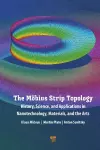
The Möbius Strip Topology
3 authors - Hardback
£193.00
Klaus Möbius received his Diploma in physics and chemistry (1962), his PhD in natural sciences (1965), and his Habilitation in experimental physics (1969) from the Free University Berlin (FUB), Germany. After his postdoctoral research at the University of California, USA, he joined FUB as a professor (1971). His magnetic resonance research on (bio)organic molecules was driven by national and international collaborations, for example, with groups in Berlin, Munich, Osnabrück, Mülheim (Ruhr), Jerusalem, Novosibirsk, Kazan, Moscow, Sendai, Leiden, Wroclaw, Padova, and Bologna. He has received numerous honors and awards, such as the Max Planck Research Award (1992); Roessler Lecturer Award, Cornell University, New York (2001); Cross of Merit of the Federal Republic of Germany (2006); invited scholar at Tohoku University, Sendai, Japan (2001); and fellow of the Institute for Advanced Studies at the Universities of Jerusalem (1990) and Bologna (2010).
Martin Plato received his Diploma in physics and mathematics (1962) and his PhD in natural sciences (1965) from FUB. In 1963, he joined the Research Institute of AEG, Germany, and soon became the head of its Scientific Application Laboratory. In 1971, he moved to the Institute of Experimental Physics of FUB as a senior scientist in the research group of Prof. Möbius. His main activity there was quantum computational work on super-computers for analyzing magnetic resonance spectra and to determine transient molecular intermediates of bioorganic photoreactions (until his retirement in 1997). He continued the magnetic resonance cooperation with Prof. Möbius at FUB until 2020. Since 2014, he has been working with a research team at Wilhelm Foerster Observatory, Berlin, on astrometric problems such as flyby anomaly of solar space vehicles.
Anton Savitsky received his Diploma in physics (1993) from Novosibirsk University, Russia, and his PhD (1996) from the University of Zurich, Switzerland. In 1997, he joined the research group of Prof. Möbius as a senior researcher. In 2009, he joined the Max Planck Institute of Bioinorganic Chemistry, Mülheim, Germany, as a research group leader. In 2018, he moved to the Department of Physics at the Technical University Dortmund, Germany. His research focuses on developing magnetic resonance methods, in particular at high magnetic fields, and their applications in biology, chemistry, medicine, and physics.